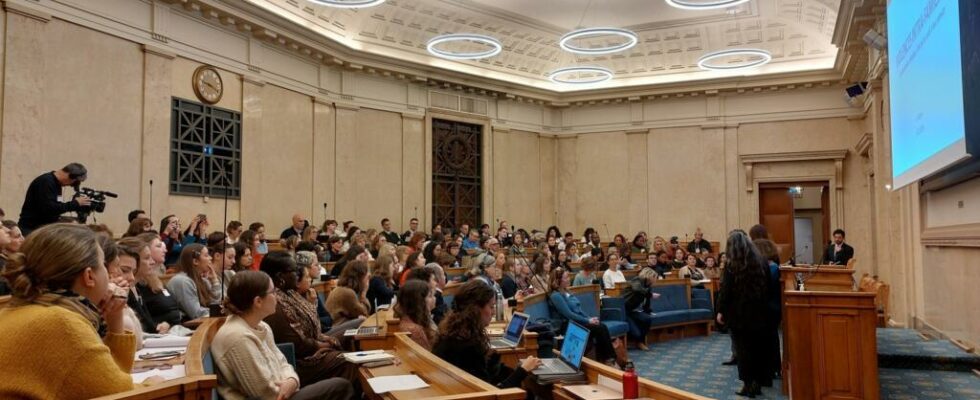This is the trial that we are talking about the most at the moment in France: that of the Mazan rapes. Fifty men tried in Avignon and accused of having raped Gisèle Pelicot, drugged without her knowledge by her ex-husband with anxiolytics for 10 years. Drugging a person without them realizing it, for criminal purposes, is what we call chemical submission. A practice far from being new, but more widely publicized during the Mazan trial. However, it remains largely unknown to health professionals. So to help them identify and support victims, training is offered to them, as at the National Assembly.
They are doctors, midwives, emergency doctors and, many of them, still studying. They arrive with their questions. “ If we have a suspicion of chemical submission, is it not better to take blood and urine samples in the emergency? ? », asks a participant. To respond, a forensic doctor, specialized in the care of victims of chemical submission: “ It would be necessary to train professionals, nurses in your department who are able to ensure that what was taken was taken correctly, in the right tubes. »
In the back row, Flavie scribbles a few notes in her notebook. In the seventh year of general medicine in Paris, Franceshe never studied chemical submission: “ We hear a lot about domestic violence, cycles of violence, but it’s true that chemical submission, we haven’t heard about it in the context of our studies. »observes the student.
Chemical submission is a textbook unthinkable. So much so that Margaux, a student midwife, assures her: she would have a hard time detecting the symptoms of a victim and taking care of them: “ I am clearly not capable of it and that is also why I chose to come, to train myself in this, because I was not at all comfortable with the question. This is essential for our training and so that we can see women in any office, in any department and be able to help them. »
“We need to talk about it and popularize it”
Helping, advising the victim, directing them to the best contact, that is the objective of this training. The interest is also to avoid the medical errors identified in the Mazan trial. Gisèle Pelicot had alerted his doctors, citing gynecological pain and memory loss, but none had established a link with chemical submission. For gynecologist Ghada Hatem, founder of the Maison des femmes, these are new reflexes that must be acquired: “ When a person goes to the doctor and says : “I feel strange, I fall asleep easily”instead of saying : “She’s crazy”we should immediately think of substances that she takes against her will. You must always question the patient who, perhaps, is experiencing things that he will not spontaneously talk to you about. But if you ask, he’ll tell you. »
The other question raised by the Mazan trial is how Gisèle Pelicot’s ex-husband obtained so many anxiolytics, without alerting his pharmacist. For Ghada Hatem, we need to start thinking about medicine: “ You can go with a prescription to four pharmacies or to three different doctors by saying : “I have trouble sleeping”. Each doctor, in good faith, will prescribe you one, two or three boxes of a medication. So, we have to reduce stocks. And unfortunately, today, we don’t really control what people buy. This is why we need to talk about it and popularize it. »
After a day of attentive listening, Flavie confirms the interest of this training: “ It’s interesting to know how it works and how patients are taken care of. It becomes more concrete. » The student promises to share what she learned with other students.
Also readMazan affair: Gisèle Pelicot castigates a “macho” society which must “change its outlook on rape”
